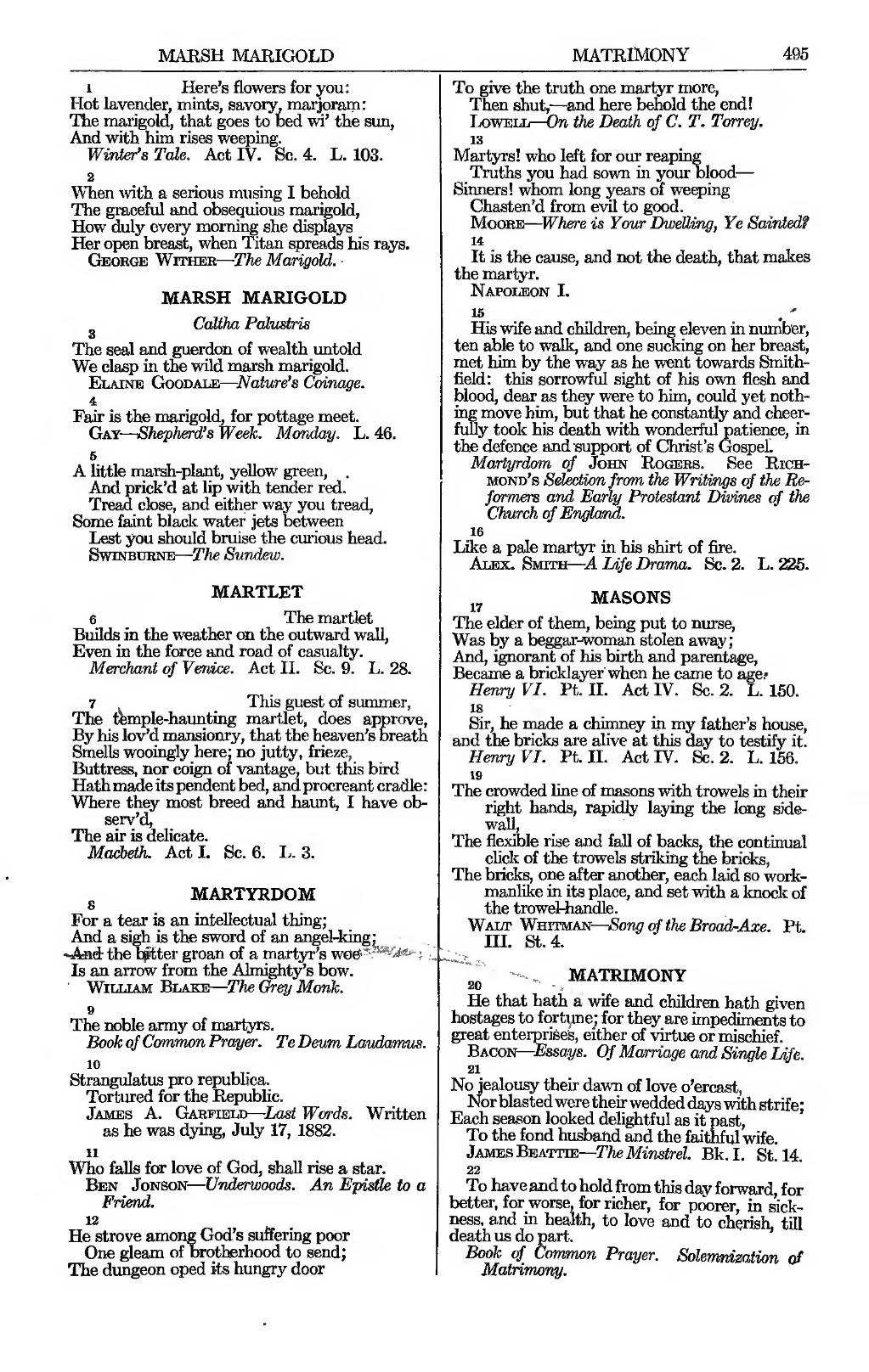MARSH MARIGOLD MATRIMONY
Here's flowers for you:
Hot lavender, mints, savory, marjoram:
The marigold, that goes to bed wi' the sun,
And with him rises weeping.
Winter's Tale. Act IV. Sc. 4. L. 103.
When with a serious musing I behold
The graceful and obsequious marigold,
How duly every morning she displays
Her open breast, when Titan spreads his rays.
George Wither—The Marigold.
MARSH MARIGOLD
Caltha Palustris
The seal and guerdon of wealth untold
We clasp in the wild marsh marigold.
Elaine Goodale—Nature's Coinage.
Fair is the marigold, for pottage meet.
Gay—Shepherd's Week. Monday. L. 46.
A little marsh-plant, yellow green, .
And prick'd at lip with tender red.
Tread close, and either way you tread,
Some faint black water jets between
Lest you should bruise the curious head.
Swinburne—The Sundew.
| author =
| work =
| place =
| note =
| topic = Marsh Marigold
| page = 495
}}
MARTLET
{{Hoyt quote
| num =
| text = <poem> The martlet
Builds in the weather on the outward wall,
Even in the force and road of casualty.
Merchant of Venice. Act II. Sc. 9. L. 28.
This guest of summer,
The temple-haunting martlet, does approve,
By his lov'd mansionry, that the heaven's breath
Smells wooingly here; no jutty, frieze,
Buttress, nor coign of vantage, but this bird
Hath made its pendent bed, and procreant cradle :
Where they most breed and haunt, I have observ'd,
The air is delicate.
Macbeth. Act I. Sc. 6. L. 3.
MARTYRDOM
For a tear is an intellectual thing;
And a sigh is the sword of an angel-king;
-And- the better groan of a martyr's woet'
Is an arrow from the Almighty's bow.
The noble army of martyrs.
Book of Common Prayer. Te Deum Laudamus.
Strangulatus pro republica.
Tortured for the Republic.
James A. Garfield—Last Words. Written as he was dying, July 17, 1882.
Who falls for love of God, shall rise a star.
Ben Jonson—Underwoods. An Epistle to a
Friend.
He strove among God's suffering poor
One gleam of brotherhood to send;
The dungeon oped its hungry door
To give the truth one martyr more,
Then shut,—and here behold the end!
| author = Lowell
| work = On. the Death of C. T. Torrey.
Martyrs! who left for our reaping
Truths you had sown in your blood—
Sinners! whom long years of weeping
Chasten'd from evil to good.
Moore—Where is Your Dwelling, Ye Sainted?
It is the cause, and not the death, that makes the martyr.
His wife and children, being eleven in number, ten able to walk, and one sucking on her breast, met him by the way as he went towards Smithfield: this sorrowful sight of his own flesh and blood, dear as they were to him, could yet nothing move him, but that he constantly and cheerfully took his death with wonderful patience, in the defence and support of Christ's Gospel.
Martyrdom of John Rogers. See Richmond's Selection from the Writings of the Reformers and Early Protestant Divines of the
Church of England.
Like a pale martyr in his shirt of fire.
Alex. Smith—A Life Drama. Sc. 2. L. 225.
MASONS
The elder of them, being put to nurse,
Was by a beggar-woman stolen away;
And, ignorant of his birth and parentage,
Became a bricklayer when he came to age.Henry VI. Pt. II. Act IV. Sc. 2. L. 150.
Sir, he made a chimney in my father's house,
and the bricks are alive at this day to testify it.
Henry VI. Pt. II. Act IV. Sc. 2. L. 156.
The crowded line of masons with trowels in their
right hands, rapidly laying the long sidewall,
The flexible rise and fall of backs, the continual
click of the trowels striking the bricks,
The bricks, one after another, each laid so workmanlike in its place, and set with a knock of the trowel-handle.
Walt Whitman—Song of the Broad-Axe. Pt. III. St. 4.
MATRIMONY
He that hath a wife and children hath given
hostages to fortune; for they are impediments to
great enterprises, either of virtue or mischief.
Bacon—Essays. Of Marriage and Single Life.
No jealousy their dawn of love o'ercast,
Nor blasted were their wedded days with strife;
Each season looked delightful as it past,
To the fond husband and the faithful wife.
James Beatihe—The Minstrel. Bk. I. St. 14.
To have and to hold from this day forward, for
better, for worse, for richer, for poorer, in sickness, and in health, to love and to cherish, till
death us do part.
Book of Common Prayer. Solemnization of Matrimony.
